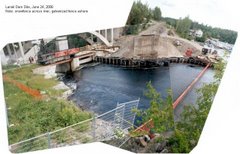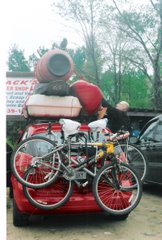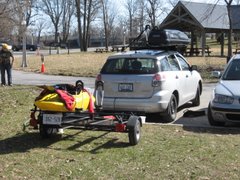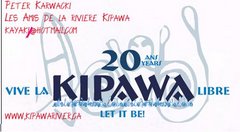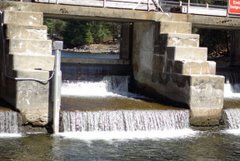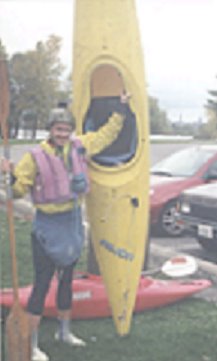Scott Sorensen approached the executive with a proposition that will help future rallies greatly by arranging a work crew to remediate the Hollywood Portage trail.
He identified four workmen from Intercity Toronto, through the daughter of John Muse, that were willing to work for two days
installing cedar logs on the Hollywood bypass/portage which was
in disrepair and actually quite dangerous.
For some that knew, the mud on the trail is so deep in some places that a person could easily sink hip deep into mud. Nails from the old boardwalk had become a hazzard.
For $800 the work was completed. That is $100 per person per day, to lay down the logs on the portage.
Scott also advised that the log that had drifted into the top eddy above the portage had been cut and removed as well.
This project was something the executive had discussed in the past as necessary but had difficulty mounting a work party. Les Amis had the funds in their bank account, it fits the organization's mandate, and was a
good collaborative effort with the Sorensens.
The executive agreed, and the initiative was approved.
Peter Karwacki, President
Luc LaFreniere, vice president
Amelie Mercier , membership chair/secretary
Francois Diebolt ,treasurer.
Note: the following non voting positions were also consulted and there was unanimous agreement to proceed.
Jeremie Roy, rally coordinator
Advisory executive members
Maxime Geoffroy
Scott Sorensen
Rick Issacson
Annie Chapdelaine
Simon Carrier
Felix Touzin
Patrick Lesage
Friday, September 13, 2013
Wednesday, September 11, 2013
PUTIN ADDRESSES AMERICANS DIRECTLY IN THE NEW YORK TIMES!
Vladimir Putin Addresses America In NYT Op-Ed; Calls For Caution In Syria, Denounces "American Exceptionalism"
Submitted by Tyler Durden on 09/11/2013 20:45 -0400A Plea For Caution From Russia
Recent events surrounding Syria have prompted me to speak directly to the American people and their political leaders. It is important to do so at a time of insufficient communication between our societies.
Relations between us have passed through different stages. We stood against each other during the cold war. But we were also allies once, and defeated the Nazis together. The universal international organization — the United Nations — was then established to prevent such devastation from ever happening again.
The United Nations’ founders understood that decisions affecting war and peace should happen only by consensus, and with America’s consent the veto by Security Council permanent members was enshrined in the United Nations Charter. The profound wisdom of this has underpinned the stability of international relations for decades.
No one wants the United Nations to suffer the fate of the League of Nations, which collapsed because it lacked real leverage. This is possible if influential countries bypass the United Nations and take military action without Security Council authorization.
The potential strike by the United States against Syria, despite strong opposition from many countries and major political and religious leaders, including the pope, will result in more innocent victims and escalation, potentially spreading the conflict far beyond Syria’s borders. A strike would increase violence and unleash a new wave of terrorism. It could undermine multilateral efforts to resolve the Iranian nuclear problem and the Israeli-Palestinian conflict and further destabilize the Middle East and North Africa. It could throw the entire system of international law and order out of balance.
Syria is not witnessing a battle for democracy, but an armed conflict between government and opposition in a multireligious country. There are few champions of democracy in Syria. But there are more than enough Qaeda fighters and extremists of all stripes battling the government. The United States State Department has designated Al Nusra Front and the Islamic State of Iraq and the Levant, fighting with the opposition, as terrorist organizations. This internal conflict, fueled by foreign weapons supplied to the opposition, is one of the bloodiest in the world.
Mercenaries from Arab countries fighting there, and hundreds of militants from Western countries and even Russia, are an issue of our deep concern. Might they not return to our countries with experience acquired in Syria? After all, after fighting in Libya, extremists moved on to Mali. This threatens us all.
From the outset, Russia has advocated peaceful dialogue enabling Syrians to develop a compromise plan for their own future. We are not protecting the Syrian government, but international law. We need to use the United Nations Security Council and believe that preserving law and order in today’s complex and turbulent world is one of the few ways to keep international relations from sliding into chaos. The law is still the law, and we must follow it whether we like it or not. Under current international law, force is permitted only in self-defense or by the decision of the Security Council. Anything else is unacceptable under the United Nations Charter and would constitute an act of aggression.
No one doubts that poison gas was used in Syria. But there is every reason to believe it was used not by the Syrian Army, but by opposition forces, to provoke intervention by their powerful foreign patrons, who would be siding with the fundamentalists. Reports that militants are preparing another attack — this time against Israel — cannot be ignored.
It is alarming that military intervention in internal conflicts in foreign countries has become commonplace for the United States. Is it in America’s long-term interest? I doubt it. Millions around the world increasingly see America not as a model of democracy but as relying solely on brute force, cobbling coalitions together under the slogan “you’re either with us or against us.”
But force has proved ineffective and pointless. Afghanistan is reeling, and no one can say what will happen after international forces withdraw. Libya is divided into tribes and clans. In Iraq the civil war continues, with dozens killed each day. In the United States, many draw an analogy between Iraq and Syria, and ask why their government would want to repeat recent mistakes.
No matter how targeted the strikes or how sophisticated the weapons, civilian casualties are inevitable, including the elderly and children, whom the strikes are meant to protect.
The world reacts by asking: if you cannot count on international law, then you must find other ways to ensure your security. Thus a growing number of countries seek to acquire weapons of mass destruction. This is logical: if you have the bomb, no one will touch you. We are left with talk of the need to strengthen nonproliferation, when in reality this is being eroded.
We must stop using the language of force and return to the path of civilized diplomatic and political settlement.
A new opportunity to avoid military action has emerged in the past few days. The United States, Russia and all members of the international community must take advantage of the Syrian government’s willingness to place its chemical arsenal under international control for subsequent destruction. Judging by the statements of President Obama, the United States sees this as an alternative to military action.
I welcome the president’s interest in continuing the dialogue with Russia on Syria. We must work together to keep this hope alive, as we agreed to at the Group of 8 meeting in Lough Erne in Northern Ireland in June, and steer the discussion back toward negotiations.
If we can avoid force against Syria, this will improve the atmosphere in international affairs and strengthen mutual trust. It will be our shared success and open the door to cooperation on other critical issues.
My working and personal relationship with President Obama is marked by growing trust. I appreciate this. I carefully studied his address to the nation on Tuesday. And I would rather disagree with a case he made on American exceptionalism, stating that the United States’ policy is “what makes America different. It’s what makes us exceptional.” It is extremely dangerous to encourage people to see themselves as exceptional, whatever the motivation. There are big countries and small countries, rich and poor, those with long democratic traditions and those still finding their way to democracy. Their policies differ, too. We are all different, but when we ask for the Lord’s blessings, we must not forget that God created us equal.
POLAND PRIVATIZES PRIVATE PENSION PLANS
Modified from http://www.zerohedge.com/news/2013-09-06/poland-confiscates-half-private-pension-funds-cut-sovereign-debt-load
Poland announced quietly that it would transfer to the state the bulk of assets owned by the country's private pension funds (many of them owned by such foreign firms as PIMCO parent Allianz, AXA, Generali, ING and Aviva). In effect, the state just nationalized roughly half of the private sector pension fund assets calling it a "pension overhaul."
In Poland, mandatory contributions are made into both the state pension vehicle, known as ZUS, and private funds, which are collectively known by the Polish acronym OFE. Bonds make up roughly half the private funds' portfolios, with the rest company stocks.
Nobody expected that this would involve private sector assets.
Private funds within the state-guaranteed system have their bond holdings transferred to a state pension vehicle, but keep their equity holdings.
The funds would effectively be left with only the equities portions of their assets, even this would be depleted, and there will be uncertainty about the number of new savers joining.
The reason - too much debt.
By shifting some assets from the private funds into ZUS, the government can book those assets on the state balance sheet to offset public debt, giving it more scope to borrow and spend. Finance Minister Jacek Rostowski said the changes will reduce public debt by about eight percent of GDP. This in turn, he said, would allow the lowering of two thresholds that deter the government from allowing debt to raise over 50 percent, and then 55 percent, of GDP. Public debt last year stood at 52.7 percent of GDP, according to the government's own calculations.
To summarize:
The response to the confiscation was, naturally, one of shock:
End result: "The Polish pension funds' organisation said the changes may be unconstitutional because the government is taking private assets away from them without offering any compensation.... This may lead to the private pension systems shutting down," said Rafal Benecki of ING Bank Slaski."
Two most recent European blueprints for preserving the myth of solvency are: bail-ins, which confiscate deposits, and pension fund "overhauls", which confiscate, well, pension funds.
And now, back to the global recovery soap opera.
**********Have a Nice Day**********
Poland announced quietly that it would transfer to the state the bulk of assets owned by the country's private pension funds (many of them owned by such foreign firms as PIMCO parent Allianz, AXA, Generali, ING and Aviva). In effect, the state just nationalized roughly half of the private sector pension fund assets calling it a "pension overhaul."
In Poland, mandatory contributions are made into both the state pension vehicle, known as ZUS, and private funds, which are collectively known by the Polish acronym OFE. Bonds make up roughly half the private funds' portfolios, with the rest company stocks.
Nobody expected that this would involve private sector assets.
Private funds within the state-guaranteed system have their bond holdings transferred to a state pension vehicle, but keep their equity holdings.
The funds would effectively be left with only the equities portions of their assets, even this would be depleted, and there will be uncertainty about the number of new savers joining.
The reason - too much debt.
By shifting some assets from the private funds into ZUS, the government can book those assets on the state balance sheet to offset public debt, giving it more scope to borrow and spend. Finance Minister Jacek Rostowski said the changes will reduce public debt by about eight percent of GDP. This in turn, he said, would allow the lowering of two thresholds that deter the government from allowing debt to raise over 50 percent, and then 55 percent, of GDP. Public debt last year stood at 52.7 percent of GDP, according to the government's own calculations.
To summarize:
- Government has too much debt to issue more debt
- Government nationalizes private pension funds making their debt holdings an "asset" and commingles with other public assets
- New confiscated assets net out sovereign debt liability, lowering the debt/GDP ratio
- Debt/GDP drops below threshold, government can issue more sovereign debt
The response to the confiscation was, naturally, one of shock:
Catastrophic consequences for fund flows aside, the Polish prime minister had a prompt canned response:The reform is "a decimation of the ...(private pension fund) system to open up fiscal space for an easier life now for the government," said Peter Attard Montalto of Nomura. "The government has an odd definition of private property given it claims this is not nationalisation."
"This is worse than many on the markets had feared," a manager at one of the leading pension funds, who asked not to be identified, told Reuters.
"The devil is in the detail and we don't yet know a lot about the mechanism of these changes, what benchmarks will be use to evaluate our performance... (It) looks like pension funds will lose a lot of flexibility in what they can invest."
You see, he is from the government, and he is confiscating the pensions to make them safer. Confiscation is Safety and all that...Tusk said people joining the pension system in the future would not be obliged to pay into the private part of the system. Depending on the finer points, this could mean still fewer assets in the private funds.
"The (current) system has turned out to be built in part on rising public debt and turned out to be a very costly system," Tusk told a news conference.
"We believe that, apart from the positive consequence of this decision for public debt, pensions will also be safer."
Well, once you nationalize private assets, the public debt will appear lower than it was before confiscation.Polish officials have tried to reassure investors, saying the overhaul avoids the more radical options of taking both bond and equity assets away from the private funds outright.
They say the old system effectively made Polish public debt appear higher than it really is.
End result: "The Polish pension funds' organisation said the changes may be unconstitutional because the government is taking private assets away from them without offering any compensation.... This may lead to the private pension systems shutting down," said Rafal Benecki of ING Bank Slaski."
Two most recent European blueprints for preserving the myth of solvency are: bail-ins, which confiscate deposits, and pension fund "overhauls", which confiscate, well, pension funds.
And now, back to the global recovery soap opera.
**********Have a Nice Day**********
An Iconic Niagara demonstrates the value of free flowing whitewater resources
Niagara Falls - an iconic reminder of the value of free flowing whitewater resources
from the nbc newsblog
http://photoblog.nbcnews.com/_news/2010/12/16/5661928-niagara-falls-without-water-as-seen-in-1969?lite
Have a Nice Day**********
from the nbc newsblog
http://photoblog.nbcnews.com/_news/2010/12/16/5661928-niagara-falls-without-water-as-seen-in-1969?lite
Have a Nice Day**********
Monday, September 9, 2013
Interesting Video about The US, Syria, Petro Dollars, Why the US is actively destabilizing the middle east.
Who stands to benefit?
Things make so much more sense when you trace the world's problems back to human greed.
Conspiracy theories are easily dismissed out of hand until you embed the money code:
Take the blue pill: and find out how deep the rabbit hole goes.
Pete
Subscribe to:
Comments (Atom)
Useful Links
- Mount Gox - Bitcoin exchange
- Reggie Middleton's Rapier Analysis
- Ontario Rivers Alliance
- Geodesic Dome Construction
- Canadian Disaster Preparedness
- Globe and Mail
- Chris' The Weekly Telegram
- Michael Rupert of CollapseNet
- Max Keiser
- Nicole Foss Blog - the automatic earth
- Peak Moment Discussions
- Scotia Mocatta Bullion Store
- Dimitry Orlov - Peak Moment Discussions
- Jims's ISFCR Blog
- Jenny Right Side Blog
- Scott Sorensen
Alternative Energy Sites I like
The Queen is not amused!

http://www.ispeakforcanadianrivers.ca/
The Ashlu river: it could happen to you

Whitewater Ontario

Working Hard to Protect Canada's Paddling Resources
Whitewater Ontario - Mission Statement
It is Whitewater Ontario’s mission to support the whitewater paddling community through the promotion, development and growth of the sport in its various disciplines.
We accomplish this through the development of events, resources, clubs, and programs for personal and athletic development, regardless of skill level or focus, to ensure a high standard of safety and competency;
We advocate safe and environmentally responsible access and use of Ontario’s rivers.
Whitewater Ontario is the sport governing body in the province, and represents provincial interests within the national body Whitewater Canada and the Canadian Canoe Association
http://www.whitewaterontario.ca/page/mission.asp
Kipawa, Tabaret, and Opemican
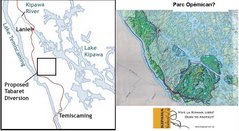
If Hydro Quebec is not actively pursuing Tabaret what is that bite out of Opemican for?
Kipawa Dam: After

Laniel Dam at 2006 Rally
Where is the Kipawa
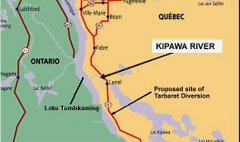
Kipawa flows into lake Temiskamingue, running from Kipawa Lake, under hwy 101 in Quebec
Kipawa Dam

laniel dam at 2004 River Rally
Tabaret is a Bad Idea
About the Kipawa
The best thing paddlers can do to help the cause of the Kipawa:
1. attend the rally and bring others including non paddlers to attend and buy beer and have fun
2. write your MP /MNA and raise the issue and post your objections -1 letter = 200 who didn't write
3. Write Thierry Vandal the CEO of Hydro Quebec strongly opposing the 132 MW standard decrying the use of "diversion" as the most environmentally inappropriate method of power production
4. Write Jean Charest, Premier of Quebec protesting that either the algonquin or the tabaret project will eliminate all other values on the Kipawa River by turning it into a dry gulch.
5. See if you can get other allied groups interested by showing your own interest, ie the Sierra Defense Fund, Earthwild, MEC, and so on.
6. Demand further consultation
7. Currently we are at the point where we need to sway public opinion and raise awareness.
However, if all else fails, don't get mad, simply disrupt, foment, and protest . The Monkey Wrench Gang.
Have you read Edward Abbey?
Important Addresses
CEO,Hydro Québec, 75 boul René Levesque, Montreal, P.Q., H2Z 1A4Caille.andre@hydro.qc.ca
The best thing paddlers can do to help the cause of the Kipawa:
1. attend the rally and bring others including non paddlers to attend and buy beer and have fun
2. write your MP /MNA and raise the issue and post your objections -1 letter = 200 who didn't write
3. Write Thierry Vandal the CEO of Hydro Quebec strongly opposing the 132 MW standard decrying the use of "diversion" as the most environmentally inappropriate method of power production
4. Write Jean Charest, Premier of Quebec protesting that either the algonquin or the tabaret project will eliminate all other values on the Kipawa River by turning it into a dry gulch.
5. See if you can get other allied groups interested by showing your own interest, ie the Sierra Defense Fund, Earthwild, MEC, and so on.
6. Demand further consultation
7. Currently we are at the point where we need to sway public opinion and raise awareness.
However, if all else fails, don't get mad, simply disrupt, foment, and protest . The Monkey Wrench Gang.
Have you read Edward Abbey?
Important Addresses
CEO,Hydro Québec, 75 boul René Levesque, Montreal, P.Q., H2Z 1A4Caille.andre@hydro.qc.ca
Tabaret is a Bad Idea (Part Two)
Les Amis de la Riviere Kipawa is poised to use an application to the Federal Court to issue a Writ of Mandamus to ensure the Minster does what he is supposed to do, protect the public's right to navigate the water control structure at Laniel, Quebec using the Navigable Waters Protection Act. (see http://www.kipawariver.ca/)
In the now gutted Navigable Waters Protection Act lay the means by which the Minister of Transport could keep the public right of passage down our great Canadian Heritage, our rivers and streams which are threatened especially by resource corporations and power brokers such as Hydro Quebec.
These powerful entities continue to petition that 'this' river or 'that' stream is not navigable and therefore not protectable.
I don't say that dams and bridges should not be built, only that if they are, historical navigation rights should be considered and preserved by making reasonable accommodations for recreational boaters.
It is the Minister of Transport, in exercising the right to allow or disallow work on or over a navigable waterway is what keeps boats and recreational boaters plying our waterways.
To many recent cases launched in the Federal Court concerning the Navigable Waters Protection Act, most recently the case of the Humber Environment Group of Cornerbrook Newfoundland versus the Cornerbrook Pulp and Paper Company indicates that the important oversight is not being faithfully performed. Have we really come to the point now where we must say "such and such a stream is one foot deep, possessing so many cubic feet per second flow and so on?" The answer to this is... YES!
The honourable Mr. Justice John A. O'Keefe, ruled that it had not been shown that the river was navigable. How convenient was that to the Minister? But either the Minister of Transport acts to protect our rivers and streams as a public right or he does not and that means rivers and streams currently enjoyed by kayakers and canoists.
Enough of the cheating, and double-talk. Canadians! our rivers and streams are our own, lets urge the Minister of Transport and the our government to protect them.
Peter Karwacki
In the now gutted Navigable Waters Protection Act lay the means by which the Minister of Transport could keep the public right of passage down our great Canadian Heritage, our rivers and streams which are threatened especially by resource corporations and power brokers such as Hydro Quebec.
These powerful entities continue to petition that 'this' river or 'that' stream is not navigable and therefore not protectable.
I don't say that dams and bridges should not be built, only that if they are, historical navigation rights should be considered and preserved by making reasonable accommodations for recreational boaters.
It is the Minister of Transport, in exercising the right to allow or disallow work on or over a navigable waterway is what keeps boats and recreational boaters plying our waterways.
To many recent cases launched in the Federal Court concerning the Navigable Waters Protection Act, most recently the case of the Humber Environment Group of Cornerbrook Newfoundland versus the Cornerbrook Pulp and Paper Company indicates that the important oversight is not being faithfully performed. Have we really come to the point now where we must say "such and such a stream is one foot deep, possessing so many cubic feet per second flow and so on?" The answer to this is... YES!
The honourable Mr. Justice John A. O'Keefe, ruled that it had not been shown that the river was navigable. How convenient was that to the Minister? But either the Minister of Transport acts to protect our rivers and streams as a public right or he does not and that means rivers and streams currently enjoyed by kayakers and canoists.
Enough of the cheating, and double-talk. Canadians! our rivers and streams are our own, lets urge the Minister of Transport and the our government to protect them.
Peter Karwacki
Tabaret is a Bad Idea (Part Three)
10 Reasons WhyTabaret is a Bad Idea1) Tabaret is too big. The station is designed to useevery drop of water available in the Kipawawatershed, but will run at only 44 percent capacity.We believe the Tabaret station is designed to usewater diverted from the Dumoine River into theKipawa watershed in the future.
2) The Tabaret project will eliminate the aquaticecosystem of the Kipawa River.The Tabaret project plan involves the diversion of a16-km section of the Kipawa River from its naturalstreambed into a new man-made outflow from LakeKipawa.
3) Tabaret will leave a large industrial footprint on thelandscape that will impact existing tourismoperations and eliminate future tourism potential.
4) The Tabaret project is an aggressive single-purposedevelopment, designed to maximize powergeneration at the expense of all other uses.
5) River-diversion, such as the Tabaret project, takinglarge amounts of water out of a river’s naturalstreambed and moving it to another place, is verydestructive to the natural environment.
6) The Kipawa River has been designated a protectedgreenspace in the region with severe limitations ondevelopment. This designation recognizes theecological, historical and natural heritage value ofthe river and the importance of protecting it.Tabaret will eliminate that value.
7) If necessary, there are other, smarter and morereasonable options for producing hydro power onthe Kipawa watershed. It is possible to build a lowimpactgenerating station on the Kipawa river, andmanage it as a “run-of-the-river” station, makinguse of natural flows while maintaining other values,with minimal impact on the environment.
8) The Kipawa watershed is a rich natural resource forthe Temiscaming Region, resonably close to largeurban areas, with huge untapped potential fortourism and recreation development in the future.Tabaret will severely reduce this potential.
9) Tabaret provides zero long-term economic benefitfor the region through employment. The plan is forthe station to be completely automated andremotely operated.
10) The Kipawa River is 12,000 years old. The riverwas here thousands of years before any peoplecame to the region. The Tabaret project will change all that.
Problems on a local River?
- There is more to do as well but you have to do your research and above all, don't give up.
- IN the meantime prepared a document itemizing the history of navigation of this spot and its recreational value. Use the Kipawa river history of navigation as a guide: see www.kipawariver.ca
- Under the Ministry of Environment guidelines you have a set period of time to petition the change under the environmental bill of rights, you may have limited time to take this action. But it involves going to court for a judicial review of the decision.
- 4. contact the ministry of natural resources officials and do the same thing.
- 3. contact the ministry of the environment and determine if they approved the project
- 2. determine if the dam was a legal dam, approved under the navigable waters protection act.
- 1. research the decision and timing of it to determine if an environmental assessment was done.
Minden Ontario
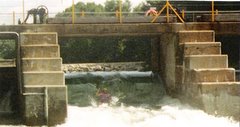
Gull River Water control at Horseshoe lake
A History of Navigation on the Kipawa River
Prior to the environmental assessment there was no signage at the Laniel Dam
T-Shirts Area: These are available now!

Send $25 and a stamped self addressed envelop for the Tshirt, and for the bumper sticker, a stamped and self addressed envelope with $5.00 for the bumper sticker to Les Amis de la rivière Kipawa, 80 Ontario St., Ottawa, Ontario, K1K 1K9 or click the link To purchase a Les Amis "T" contact Doug with the following information: Number of shirts:Sizes: Ship to Address: Method of Payment: cash, cheque and paypal, Shipto address:
Bumper Stickers Now Available

Get your bumper sticker and show your support for the Kipawa Legal Fund ! - send $5.00 in a Stamped, self addressed envelope to: Peter Karwacki Box 39111, Ottawa, Ontario, Canada, K1H 7X0



